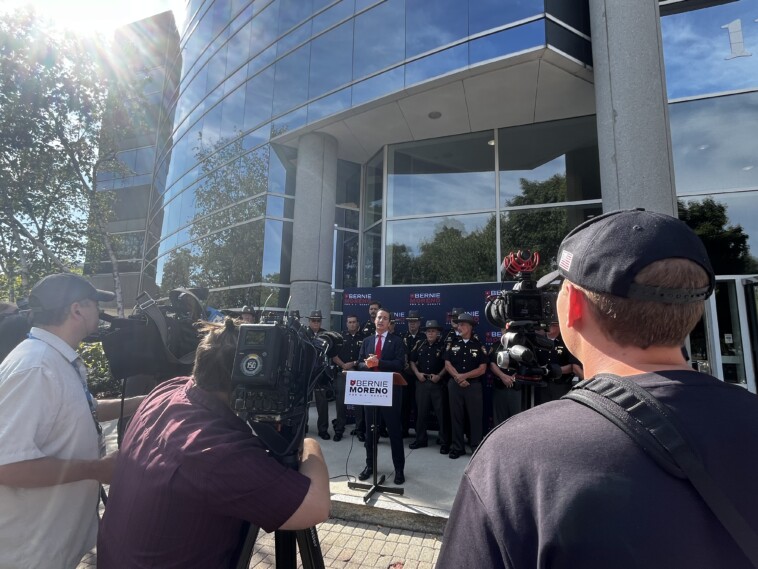COLUMBUS, Ohio — The Republican Party’s campaign to reduce everyday Americans’ tax burden crossed a thin blue line with Senate candidate Bernie Moreno’s promise to limit federal taxes on law-enforcement officers and other first responders.
“If elected, I will immediately introduce legislation to cap income tax for police officers at 5%,” Moreno said Friday in a press-only speech on police and immigration reform. “And that’s not just police. That’s for fire and other emergency workers as well.”
Moreno, flanked by nearly 30 Ohio sheriffs, said the money for such tax cuts can be recouped “easily” by slashing federal funding to states, cities and “rogue prosecutors” “not following the rules” when it comes to immigration laws.

“If you put your life on the line for us, the United States government will simply not be able to tax you above 5%,” Moreno emphasized. “We’re gonna stop the government from stealing from first responders.”
His proclamation is part of a larger trend this year from the GOP, which has dangled the prospect of no tax on tips and overtime and increased child-tax credits to motivate inflation-exhausted Americans at the ballot box.
And it seems to be working.
“I used to be a Democrat,” Scioto County Sheriff David Thoroughman, 60, told The Post. “But I’m so short staffed now. We’ve lost so many people from law-enforcement jobs. We shouldn’t even be focused on R or D right now, we should all be focused on the staffing crisis.”
Thoroughman says Moreno’s limit on federal income tax would “absolutely” be a huge help in getting more men and women into uniform.
“Bringing that down would basically be a big raise for every officer,” he said. “We want to hire people and they want to protect people. . . . But this administration won’t let us do that.”
Greene County Sheriff Scott Anger pointed to his fellow sheriffs from the podium. “And this is just a portion,” he said. “The vast majority of sheriffs in this state support Bernie Moreno.”
Despite that local support, the logistical reality and constitutional legality of Moreno’s plan remain unclear.
University of Dayton politics professor Chris Devine told The Post that to pull this off, Republicans in Washington would need to jump some seriously “complex” hurdles.
“I will say that this seems to be similar to the proposal — first made by Donald Trump, then seconded by Kamala Harris — to eliminate taxes on tips,” Devine said. “In both cases, certain types of workers are being singled out for tax breaks. This is unusual since tax rates are typically set according to income levels, rather than the type of job one has.”
Moreno and Democratic Sen. Sherrod Brown are locked in a too-close-to-call nail biter that may decide which party controls the Senate.


